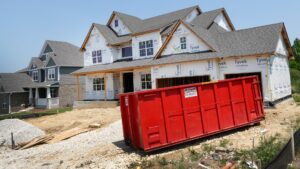The Housing Market’s Headwinds: Understanding the Impact of Tariffs on Home Prices
In recent months, the housing market has been a topic of heated debate, particularly with rising material costs that threaten to inflate home prices. The concern revolves around the tariffs implemented by former President Donald Trump, which could potentially increase construction costs by as much as $10,000 for the average new single-family home, according to the National Association of Home Builders (NAHB).
The Tariff Landscape: What You Need to Know
The NAHB has provided alarming insights into how proposed tariffs on imports from Canada and Mexico can drastically affect homebuilding costs. While formal surveys are still on the horizon, anecdotal evidence suggests that material prices could experience a spike between $7,500 and $10,000 if tariffs are enacted as previously planned.
The organization has long opposed such tariffs, arguing that they effectively act as a tax—not only on builders but also on home buyers and consumers. Key materials impacted by these tariffs include softwood lumber from Canada, gypsum from Mexico, and various steel and aluminum products, as well as household appliances sourced from China. These increases could cumulatively raise costs for imported construction materials by over $3 billion.
Homebuilder Responses: Navigating a Complicated Market
Homebuilders are feeling the dramatic implications of these tariffs. The volatilities surrounding the SPDR S&P Homebuilders ETF (XHB) illustrate this sentiment, as it has dipped more than 22% since late November. Amid market uncertainty, firms like D.R. Horton and KB Home are grappling with the potential financial burden these tariffs may impose.
Jessica Hansen, D.R. Horton’s head of investor relations, elaborated on the challenges posed by tariffs, noting that about 20% of their lumber supply comes from Canada. As they shift supply chains post-COVID-19, the looming threat from tariffs creates an additional layer of complexity.
For builders less reliant on imports, like KB Home, the situation remains precarious. Chief Operating Officer Robert McGibney warns that prices for domestically sourced materials could also rise as competitors increasingly localize their supply chains.
Economic Insights: The Market Outlook
When it comes to forecasts, industry experts remain cautiously optimistic. Ali Wolf, chief economist at housing data provider Zonda, suggests that contractors may face cost increases of anywhere between 6% to 14% due to tariffs. Moreover, the potential impact on the labor market is concerning, especially for builders located in border states, as stricter immigration policies can limit the workforce supply.
Despite these challenges, Wolf emphasizes the benefits of a pro-growth administrative approach, which could potentially mitigate some of these adverse effects. The call for deregulation is critical; streamlining the building process can alleviate some pressure on housing inventory and costs.
Conclusion: What This Means for Homebuyers and Investors
As the economic climate shifts, both homebuyers and investors should be savvy about how these tariffs will play out in the long term. The road ahead may be fraught with challenges, especially as the geopolitical landscape evolves and market conditions fluctuate.
At Extreme Investor Network, we encourage our community to stay informed and vigilant, making savvy investment choices as we navigate this complex housing market. By leveraging expert insights and staying ahead of economic trends, we empower you to make the most informed decisions regarding real estate investments.
Stay tuned to our blog for the latest updates and insights on housing market dynamics, investment strategies, and more—because understanding the intricacies of the economy can be the key to your financial success.

